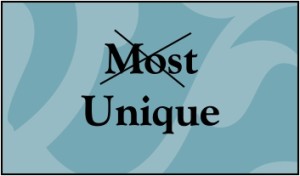Her Style Was Most Unique… NOT!
A common usage mistake in English is to use the word “unique” in a way that makes the noun it modifies seem not unique.
When we say “most unique” or “very unique” about something, what we’re really saying is the thing isn’t unique at all.
The word “unique” means something is without equal or there is nothing else like it. So there is no “uniquer” option. A thing is either unique or it isn’t. There is no continuum for uniqueness.
We wouldn’t say, “Joey wore the most unique Halloween costume,” implying it was just a tad “more unique” than someone else’s. We’d say, “Joey wore a unique Halloween costume.” It’s giving credit where credit is due.
Dangling Modifiers – Ack!
If you’re a writer, and not getting Bob Bly’s newsletter, it’s worth checking out at www.bly.com.
Here’s a tip from Bob’s ezine about dangling modifiers – you know, when you start a sentence talking about one person and slide in a reference that refers to someone else altogether… and then end the sentence referring back to the first individual.
For example:
WRONG: “As a policyholder, I want you to know that you can reduce your premium by 50% this year.”
CORRECT: “As a policyholder, you can reduce your premium by 50% this year.”
“Try To” versus “Try And”
The correct usage is “I will try to fix it” rather than “I will try and fix it.”
While the latter usage now has its foot in the door in more relaxed writing, when you’re writing in a more formal situation, “try to” is the right version to use.


